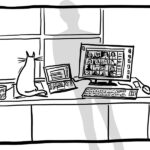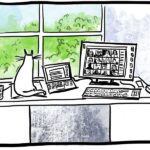COVID-19 has caused an explosion in virtual legal work.
Growing up in Malaysia, Shiau Yen Chin-Dennis, managing partner at law firm K&L Gates’ Portland office, says she never got to see cutting-edge technology in action.
“Where I grew up all the phones still had cords attached to them,” she says.
Chin-Dennis says her upbringing made her more excited to use technology in her professional life. She has brought her love of high-tech trends to her position K&L Gates, and says her firm’s adoption of remote working technology was already gaining steam, even before COVID-19 outbreak.
“If there’s a silver lining to all this, it has accelerated the change in adopting technology,” says Chin-Dennis. “When we’re allowed back into the office we might explore other models of working from home. As a manager, I enjoy hearing how my employees are more productive.”
Remote working has turned the profession of legal work on its head. Lawyers are known for working long hours in office settings. The pandemic has brought this office culture to an abrupt halt.
K&L Gates is also “relying more than ever” on artificial intelligence programs. Chin-Dennis says the economic downturn is causing many clients to look for ways out of contractual obligations to save money. They want all their legal documents reviewed, something legal artificial intelligence programs like Kira are able to do more quickly and more accurately than human lawyers.
RELATED STORY: A Robot at the Bench
The outbreak of COVID-19 was first felt in China where K&L Gates has offices in Beijing and Shanghai. While the pandemic has caused a decline in overall business for the frim, Chin-Dennis says the firm’s global presence gave her office a preview of what was ahead and the time to prepare.
“We first started telecommuting in Asia. As we watched what was happening over there, we anticipated how things were going to escalate, and it helped us prepare our Portland office,” she says. “We turned on the telecommuting even before the governor’s order.”
Chin-Dennis says that business has seen a downturn in revenue since COVID-19, especially in mergers and acquisitions.
Kjersten Turpen, partner at K&L Gates, says one element of legal life that is different are depositions. While recording depositions is possible remotely, it is harder to see an interviewee’s first reaction to a presented document, something she says is important for lawyers to witness.
“You now have to send your documents to the court reporters ahead of time so you can see the person’s reaction. Otherwise they could get coached. It makes it so you have to think about what documents you want to see an initial reaction from, and which documents are the ones that everyone already knows about,” says Turpen.
Ryan Hunt, who practices family law at Garrett Hemann Robertson in Salem, says that the transition to working remotely has gone better than expected. Although jury trials are impossible to perform remotely, his firm adapted to make arbitration work possible.
“Obviously family law is stressful to begin with, but as we’ve adapted to working remotely, things have gotten better. We’re still getting the same kind of cases, and people are trying to do mediations remotely,” says Hunt.
Instead of being in two separate rooms, a lawyer mediating between two parties looks a little different nowadays. A lawyer is now on two different internet calls, moving between the Zoom or Microsoft Teams sessions to communicate with both parties. While Hunt has not yet been part of a hearing remotely, he says family law is “moving in that direction.”
Hunt says the remote-working changes are not here to stay, at least at his firm. “When the team is able, we’re going to go back to the office. I don’t think you can beat the impact of being able to walk around the corner and talk with your colleague.”
Benjamin Kearney, who practices estate law at Arnold Gallagher Attorneys at Law in Eugene, says that the uncertainty of the pandemic has resulted in clients “coming out of the woodwork” to finalize documents. The pandemic has caused younger people to put together wills and other end-of-life documents, he says, although overall business has not seen a significant increase.
“A lot of times people think, ‘I only need estate planning at the end of my life,’ but arguably the most important time to have an estate plan is when you have a young family. Recently the younger crowd is starting to show up a little bit more,” says Kearney.
While much of his work can be done remotely, the signing and finalizing of documents still has to happen in person. He expects the efficiencies that come along with remote contact with clients to stay.
While these new, younger clients are savvy about the remote communication technology, some of his older clients are not as comfortable. But the convenience of virtual meetings makes life a lot easier for those whose movement is more limited.
“Lane County is a relatively large county. I think there will always be some clients who want to look you in the eye, but it’s nice not having to come all the way to Eugene when you live in Elkridge,” he says.
To subscribe to Oregon Business, click here.








